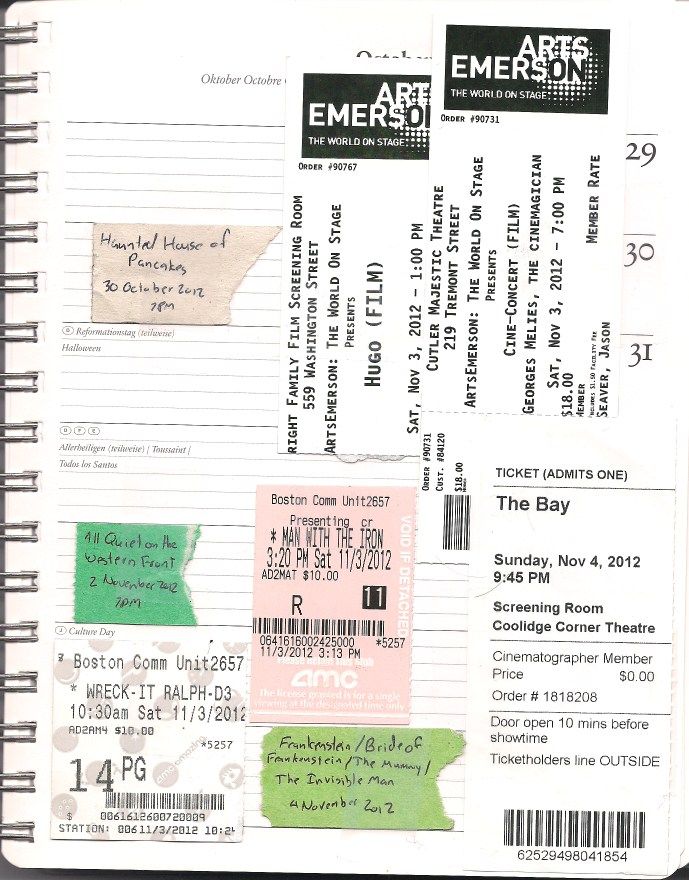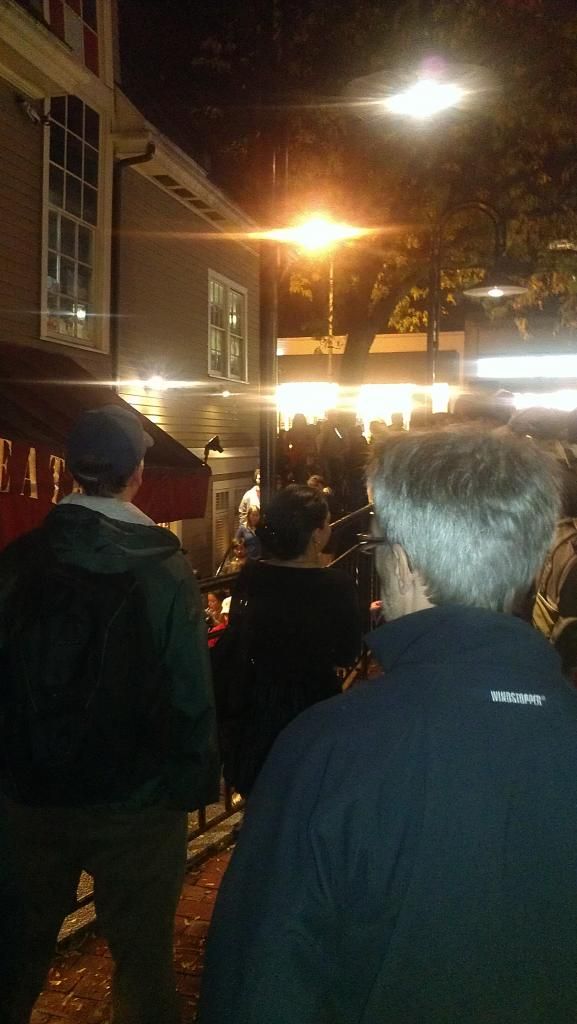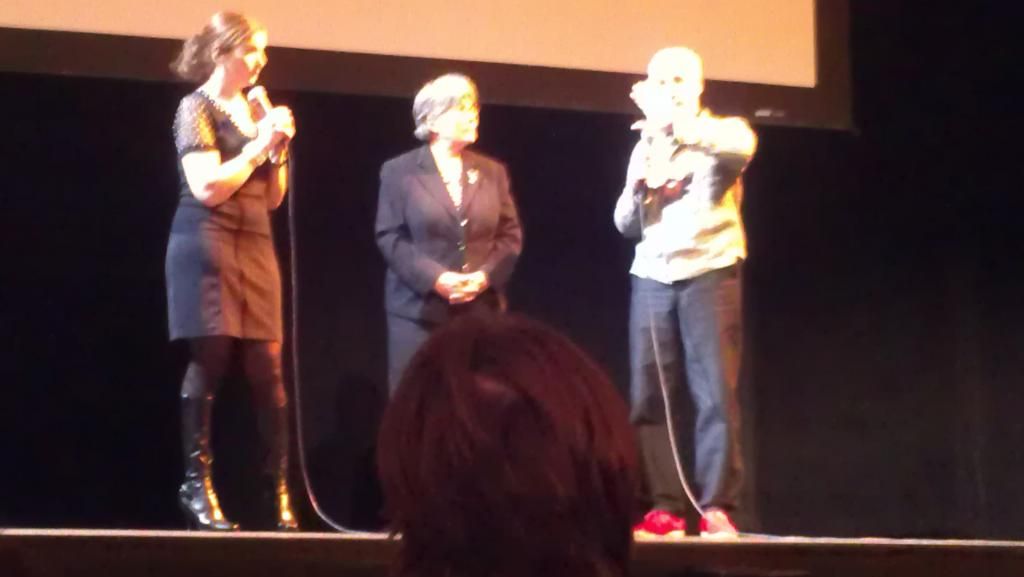
How busy? Well, let's break out some Horrible Photography!

That's the line at the Brattle waiting to get into The Haunted House of Pancakes, presented by the International Pancake Film Festival. Now, I've got no idea if the IPFF is part of a culture of Boston-area pancake fandom that I was previously and sadly unaware of, if people just happened to see it on the Brattle schedule or entertainment listings and thought it sounded like good cheap fun, or if a program with a dozen shorts made by locals is going to fill a room just by having cast and crew show up, but it drew a nice crowd. Previous shows have mostly been in smaller venues (the host said this was their first time in an actual theater), so there was a lot of waiting in line - both to get in (because they didn't start selling tickets until the 7pm start time) and for the pancakes being cooked in the back of the auditorium. At least it made for a fun time.
I'd be back at the Brattle later in the week for the start of the Universal's 100th Anniversary celebration, with All Quiet on the Western Front on Friday and the Monster Marathon - Frankenstein, Bride of Frankenstein, The Mummy, and The Invisible Man - on Sunday. It bears mentioning that Universal is doing a great job with their centennial celebration: Bunches of new prints and box sets (I love my new Hitchcock Blu-ray set!), and a curated program done in partnership with the UCLA Film and Television Archive that is touring many cities, finding a natural home at the Brattle in the Boston area. Paramount, meanwhile, celebrated their 100th by re-releasing the usual catalog titles on video with new trade dress, clearing their theatrical release schedule, and licensing more or less their entire catalog to Warner Brothers.
Saturday was a sort of back-and-forth day - on the train early to get to the cheap 3D show of Wreck-It Ralph at Boston Common, out the back and into the next theater over for Hugo in 35mm, back to Boston Common for The Man with the Iron Fists, kill some time and a sandwich at Potbelly's while scribbling reviews in a notebook (the movies I chose to see first this weekend because they had no reviews on EFC would, amusingly, have other reviews posted while I was writing mine), and then over to the Cutler for the Georges Méliès Ciné-Concert, which yielded some real no-exaggeration Horrible Photography:

There was a "no flash photography" rule in place, but even if there wasn't, I think this picture just wasn't happening. From left to right, that's translator Barbara Bouquegneau from the French Cultural Center, narrator Marie-Hélène Lehérissey (Méliès's great-granddaughter), and pianist Lawrence Lehérissey (her son and thus Méliès's great-great-grandson). It was a nifty little affair.
And, finally I finished the weekend off with a screening of The Bay in the Cooldige's screening room. It only played a week there, which is a shame; it's a nifty little movie that's more grounded than many of its found-footage brethren and uses its believability to great advantage.
"The Haunted House of Pancakes"
Seen 30 October 2012 in the Brattle Theatre (International Pancake Film Festival Presents, digital)
With all the pancakes and syrup being served in the back of the theater, I'm fairly surprised that the Brattle wasn't winning an award for All-Time Stickiest Move Theater Floor (Non-Porno Division). But that didn't happen, because people who go to the Brattle are generally cool.
To give star grades and critique the filmmaking of these shorts would not quite be a bit pointless; I'm guessing that the vast majority are one-offs made by folks who say that the IPFF exists and thought it might be worth a lark. There are some noteworthy entries, though - "Pirates of Pancake Island" by Shannon Daly, Jeanne Flanagan, Melitta King, and Bill Trudell of Somerville is a kind of adorable bit of Lego-based stop motion, and while "Jophaboia" by Adric Giles of Watertown is more amusing than most spoofs of artsy French films. Speaking entirely seriously, I like that Giles and company didn't process it to look like a scratched up piece of film, but allowed the shortcomings of low-end digital to come through rather than trying to imitate yesterday's aesthetics. Let your movie honestly represent its time, for better or worse! I also had a good chuckle or three at "The Fall of the House of Pancakes" from Somerville's Collective Fedora.
But let us never speak of Tim Stigliano's "Enough is Never Enough" again. I haven't yet had nightmares about a naked dude pouring batter on himself and cooking flapjacks while narrating the process in a dead-eyed trance, but I'm sure it's just a matter of time.
All Quiet on the Western Front
* * * * (out of four)
Seen 2 November 2012 in the Brattle Theatre (Universal Centennial, 35mm)
Despite this movie being made in 1930, there isn't necessarily a whole lot to be added to it on the subject of the way war takes young men and destroys them. The later likes of Saving Private Ryan may make the violence more graphic, and other movies may home in on the specific details of different conflicts, but everything important is here, from the promise to young men of glory and honor to the difficulty of coming home afterward.
It's somewhat fascinating to me that this movie was made from the German point of view, though. If I recall my history correct, American sentiment wasn't particularly against Germany at this point, but it was still a movie (and book before it) that took a sympathetic view of the soldiers that many in the audience had fought against. Did this make it easier to portray the institutions that used them up in a more positive light than shifting the story to America or England would have?
In terms of look and feel, it's a movie of its time, no question - actors were very much still trying to figure out what worked right in a talkie versus stage or silents - but much of the direction still holds up today. The opening shot in which a camera tracks through a window and the sound of a professor's lecture takes a while to assert itself is particularly impressive.
Hugo
* * * * (out of four)
Seen 3 November 2012 in the Paramount Theater Bright Screening Room (Celebrating Méliès, 35mm)
If one measures "favorite movie" by how many times one watches them, Hugo is certainly right up there for me among recent movies - I believe I saw it on consecutive weeks during its initial release, then again when it got an Oscar-nomination re-release. I haven't watched my Blu-ray of it yet, so this makes a mere four; it's also my first time seeing it in 2D or on film.
Predictably, the movie itself is still fantastic. At its heart, it's still a kid-friendly mystery with some amazing visuals and a great performance by Ben Kingsley, and its low-key but always moving forward pace is kind of masterful. I do think it loses just a little bit by not being in 3D - the opening sequence is clearly designed for that format, and the scene where Sacha Baron Cohen's station inspector is leaning into intimidate Hugo definitely loses something with him not actually impinging no the audience's personal space. Movies intended for 3D also seem to go with wider shots.
It's still pretty marvelous, and I'd still love it if Scorcese did a family-friendly project like this much more often.
Full review on eFilmCritic
"Méliès The Cinemagician"
Seen 3 November 2012 in the Cutler Majestic Theater (Celebrating Méliès, DVD+)
An interesting night, to say the least. Having seen Hugo fresh that afternoon, it was natural to compare the shorts shown with Scorcese's reproductions, leading me to come away impressed with his attention to detail. One thing I found somewhat surprising in the comparison was just how frantic Méliès's films were. Often running mere minutes or even seconds, they feature Méliès and his co-stars running all over the place, not stopping for dialogue of any kind (not even the silent type where there are no intertitles but the thoughts are clear), with a ton of special effects that make the image jumpy or otherwise busy. It's no wonder that Méliès tended to prefer showing them in this sort of "Ciné-Concert", with someone playing an instrument and a narrator telling the story that the film itself literally cannot slow down to explain. In their original run, Georges Méliès himself would perform this task; he later passed it down to his opera singer son André, who passed it on to his granddaughter, who performed in Boston.
It was, admittedly, a bit rough at times - I gather English is her third language after French and Spanish and she mentioned that it was only her second time doing this for an English-language audience (despite 30 years carrying the torch). Mostly, she narrated in French and sometimes added an English translation, and I know just enough French to get frustrated - I listen, catch the occasional word, and then find myself concentrating enough on trying to translate that I'm missing everything else. Even when an English translation came, it would be a bit out of sync in my head.
Still, there were some amazing bits of the program. "A Trip to the Moon" is always welcome, for instance, and "The Coronation of Edward VII" had a nifty story behind it: Méliès had wanted to film the actual coronation (England's first in 60-odd years after Victoria's long reign), but was denied. So he staged it himself, and because the coronation was delayed, his "recreation" appeared at roughly the same time as the actual event. The new king saw it and would mention to Méliès that he had been ill and thus they had had to rush and compact the program, so the other version was arguably "better".
In any event, a very nifty experience, and probably the most authentic way to see these early, pioneering works of cinema.
Frankenstein
* * * * (out of four)
Seen 4 November 2012 in the Brattle Theatre (Universal Centennial, 35mm)
Depending how much time I can find, I may go back and review the Universal movies I'm zipping over here, although I've already done so in the case of Frankenstein. So this might as well be quick.
It is, of course, fantastic, in large part because of Boris Karloff's legendary performance as the Monster. I must admit, that as a fan of the book, I find it a bit odd that that performance, the furthest possible from the intelligent creature of the novel, is the thing that resonates. I think that the reason this quite frankly massive change works is that film and text are different: In the book, Mary Shelley builds her case for the Monster being deserving of the rights of humanity intellectually; we see through his cunning and intellect that he is our equal. In the film, director James Whale and the writers do it emotionally; we feel his humanity. That's indicative of the different strengths of the two media, and how adapting the themes of the book meant changing a huge part of it.
Full review (from 2006) on eFilmCritic
The Bride of Frankenstein
* * * ¾ (out of four)
Seen 4 November 2012 in the Brattle Theatre (Universal Centennial, 35mm)
That star rating is a promotion over what I gave this when I last wrote it up five-plus years ago; I'd like to think I'm older and wiser now.
One thing I recognize in this one (and it's the reason I'd really like to write a full review) is that it's thematically much darker than even most horror movies. Frankenstein is, as the book's title puts it, about the Modern Prometheus but the theme made more accessible by grounding it in the Monster's human, wounded innocence. This one is about love making people better, but in order to get tot hat, it mines a deep vein of self-hatred. Both Henry and the monster despair about their own lack of worth throughout the movie and SPOILERS! (for an 80-year-old movie) when the Bride is animated and suddenly, instantly reacts to her own face in horror, it's a real emotional self-loathing and despair that few horror movies really go for. The film ends on perhaps the saddest, most pessimistic note it can ("We belong dead."), and while it plays in the story as a noble sacrifice, it's heart-breakingly tragic. !SRELIOPS
I'm half-convinced that this is why the Monster doesn't have dialogue in later Universal Frankenstein films - he's never going to say anything as good as that last line.
The Mummy
* * ¾ (out of four)
Seen 4 November 2012 in the Brattle Theatre (Universal Centennial, 35mm)
Go figure - the other time I saw this, it was also back-to-back with Bride of Frankenstein. It's improved a little in my estimation on a second viewing, but not by that much.
I do admire its scale - the filmmakers sell the theme of reincarnation much better than many, and I think it gets downright intelligent toward the end. What initially seems like a mess of "you've reincarnated so I have to kill you so you can live forever" actually becomes a strangely nuanced story of the reincarnated princess realizing that the immortal stasis her old lover Imhotep is proposing is another kind of death, that she's moved on and can't simply go back to what she was. It's not a perfect metaphor, but it works better than one might expect.
One amusing thing - I suspect that the film wound up unusually progressive in its attitudes toward archaeology (for the time) almost by accident: They needed to keep the action in Egypt, so the treasures are not shipped back to the British Museum as likely would have happened with such a find in the 1930s. While that seems eminently sensible today, it rubs characters the wrong way in the film. Kind of funny.
The Invisible Man
* * (out of four)
Seen 4 November 2012 in the Brattle Theatre (Universal Centennial, 35mm)
Something I wonder about with The Invisible Man: Is this basically the first time a big name that a name actor was hired to basically voice a character made out of special effects, maybe doing some motion capture? After all, it's not like Claude Rains's visage appears much in this movie at all, and there's not really enough done with body language that his stunt double couldn't have done most of the work.
As I mentioned on seeing it about three years ago, The Invisible Man is really not a good movie at all beyond some impressive-for-the-time visual effects. We never get a real glimpse of the non-monstrous form of the title character, and the story seldom becomes more than is required.
Plus, Una O'Connor as one of her shreiking harridan characters. Seriously, how does a homicidal invisible man not kill her character out of sheer annoyance at the start?
3 comments:
Ouch, TWO STARS for one of the greatest SF/Horror films of all time, THE INVISIBLE MAN, and you frequently give 3 and 4 stars to soon to be forgotten (if they are ever even THOUGHT of in the first place) to scruffy indies you see at film festivals like the immortal FOLKLORE?
eeeeeeeeeeeeeesh..........
Yep. That's because THE INVISIBLE MAN is not a very good movie. It jumps around too much, the characters run the gamut of the dull to the annoying, and Una O'Connor shows up every time things start to get fun.
If it came out today, people would be jumping all over themselves to say that the effects are impressive, but the story, dialogue, and characterization are weak. Just because it's old doesn't change that..
That's just sad to think so lightly of a genuince masterwork. Oh, well, to each his own. I'm quite certain there will be revival screenings of the likes of FOLKLORE and ROBOT STORIES eighty years from now!
Yeah, right..........
Post a Comment